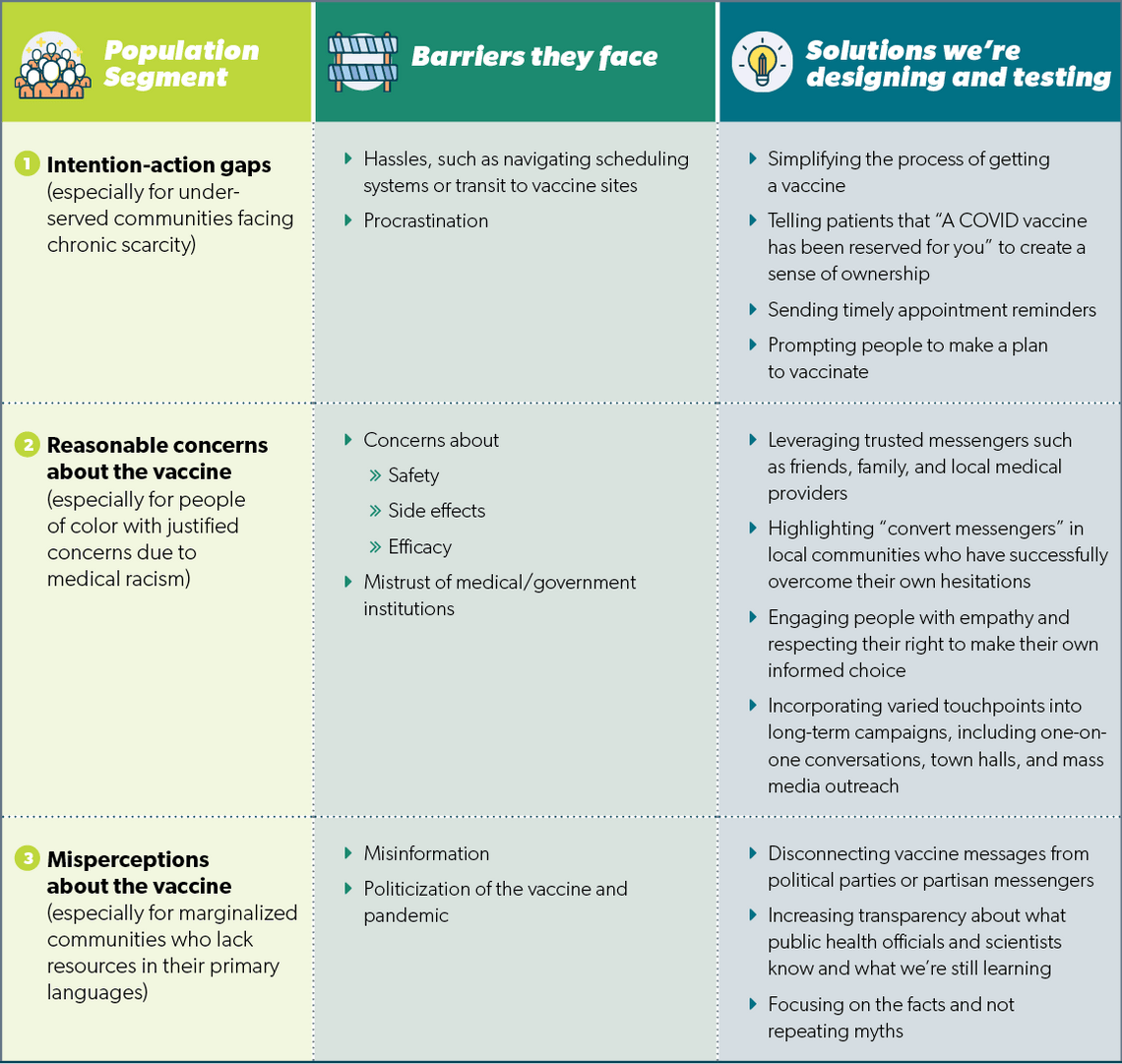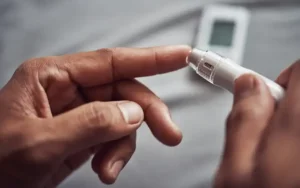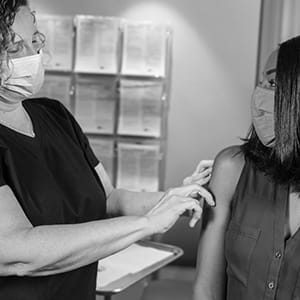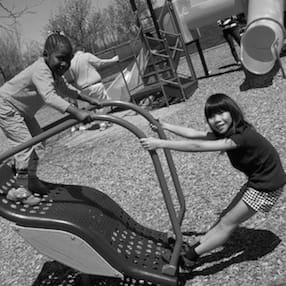COVID-19 Vaccines in the United States
HIGHLIGHTS
- Equitably increasing COVID-19 vaccinations in the U.S. requires behavioral solutions
- Behavioral insights can help the “movable middle” – those who are potentially open to a vaccine but face barriers – get their shots
Public health experts and health care providers in the United States are working tirelessly to get as many people vaccinated against COVID-19 as possible. Getting vaccinated is a crucial factor in reducing the public health and economic consequences from the ongoing global pandemic. And at the individual level the benefits of vaccination are substantial, yet many barriers to full vaccination rates exist.
Vaccine uptake is a classic behavioral problem that involves three key factors: an intention to get vaccinated, access to the vaccine, and follow-through on that intention. For people who want to get vaccinated but don’t end up doing so, as well as those still thinking about whether vaccination is right for them, behavioral science can help account for and overcome the myriad barriers they face. We’re using existing evidence and engaging key communities through surveys, focus groups, and sentiment analysis to understand behavioral barriers to COVID-19 vaccination in the U.S. We’re rapidly developing and disseminating behaviorally informed solutions through health systems, public health departments, retail pharmacies, and community groups across the country.
The Importance of Equity And Trust
Black, Latino, and Native populations in the U.S. have been disproportionately affected by the pandemic and are also more likely to face barriers to vaccine access, confidence, and uptake. They are less likely to live close to vaccination sites due to health officials’ decisions around where to operate these sites, less likely to trust government/healthcare institutions (justifiably so), and more likely to work jobs where they can’t take time off work to get the vaccine or recover from side effects. Equitably increasing vaccination rates requires multiple behavioral interventions deployed across multiple channels. Building trust and confidence–especially among communities with reasons not to trust such interventions–requires long-term, sustained engagement.
The Moveable Middle
Behavioral science is well positioned to support those in the “movable middle,” individuals who are neither especially eager to get the vaccine nor diametrically opposed to it. Falling into three groups, each requires a different solution to increase uptake:
A Small Sample of Current Work
Supporting vaccine outreach among Medicaid members with Virginia Medicaid
The Virginia Department of Medical Assistance Services (Virginia Medicaid) provides medical coverage for 1 in 5 Virginians. An important step to successfully rolling out the COVID-19 vaccine for Medicaid members is to support the care coordinators who conduct direct outreach to members about the vaccine. In collaboration with Virginia Medicaid, we’re applying behavioral insights to streamline vaccine sign-up processes, increase the clarity and transparency of informational messaging, and equip messengers with evidence-based resources for effectively responding to vaccine concerns.
Collecting data to better understand why patients decline the COVID-19 vaccine with Los Angeles County Department of Public Health
The Los Angeles County Department of Public Health (LA County Health) is responsible for providing health services to residents in the largest county in the United States. Over the course of the pandemic, LA County has seen worse COVID rates for some minority groups in particular. In data collected in Spring 2020, out of the confirmed COVID cases, Latinos in LA County had almost twice the rate of infection (114 per 100,000) compared to white individuals (78 per 100,0000). Despite high rates of infection in some groups, throughout their COVID vaccine rollout, many health centers within LA County have encountered patients declining the vaccine. To better understand the specific behavioral barriers influencing vaccine hesitancy, we worked with LA County Health to develop a questionnaire to more systematically collect and document the reasons that patients are turning down the vaccine. The questionnaire also included tailored responses that health center staff could provide based on the specific reason that patients articulated.
Increasing COVID vaccination rates in Montgomery, AL with Metropolitan United Methodist Church
In collaboration with Partners in Health, and with generous support from the Chan Zuckerberg Initiative, ideas42 is working with Metropolitan United Methodist Church in Montgomery, Alabama to increase COVID vaccination rates through a “Get Out The Vaccine” campaign. The campaign will leverage behavioral science principles to support integrating a vaccination clinic with the church’s regularly scheduled food pantry. The campaign also aims to hire and equip “Community Ambassadors” to help support others in overcoming the structural and logistical barriers to getting vaccinated that many low-income communities of color face. Community Ambassadors will engage fellow community members in one-to-one conversations to discuss their concerns, help people to navigate vaccine portals, schedule vaccination appointments, and even arrange transportation to clinics.
Interested in learning more about our work increasing rates of COVID-19 vaccination across the United States? Reach out to Lee-Sien Kao at lee-sien@ideas42.org.










